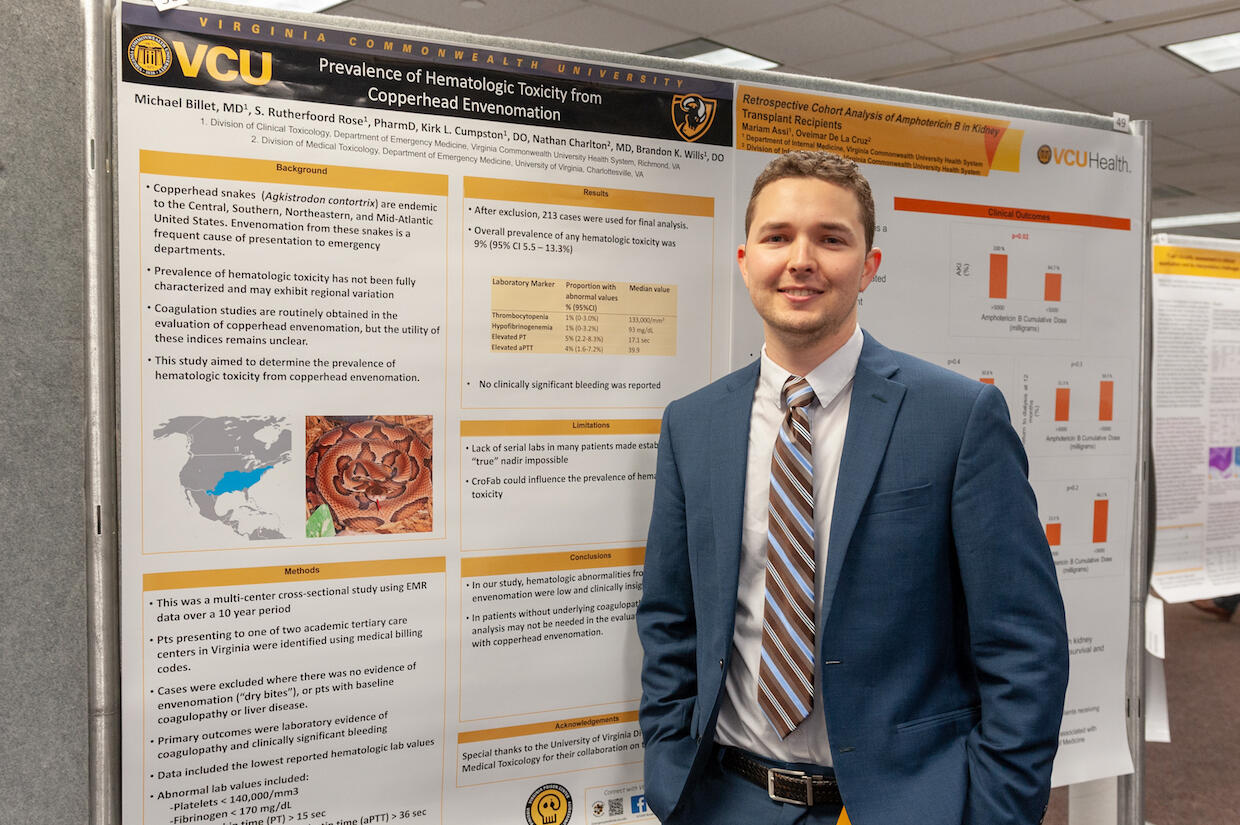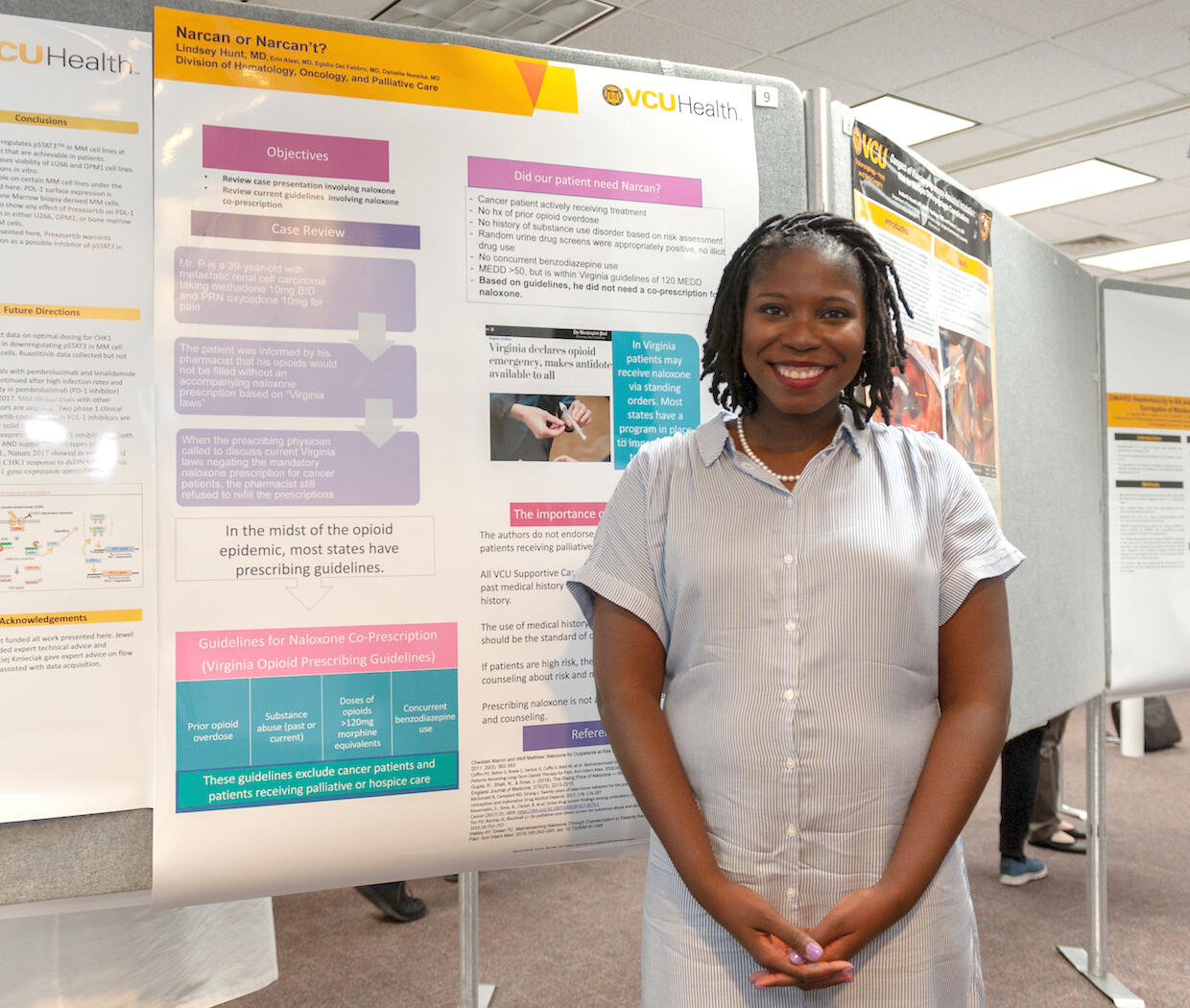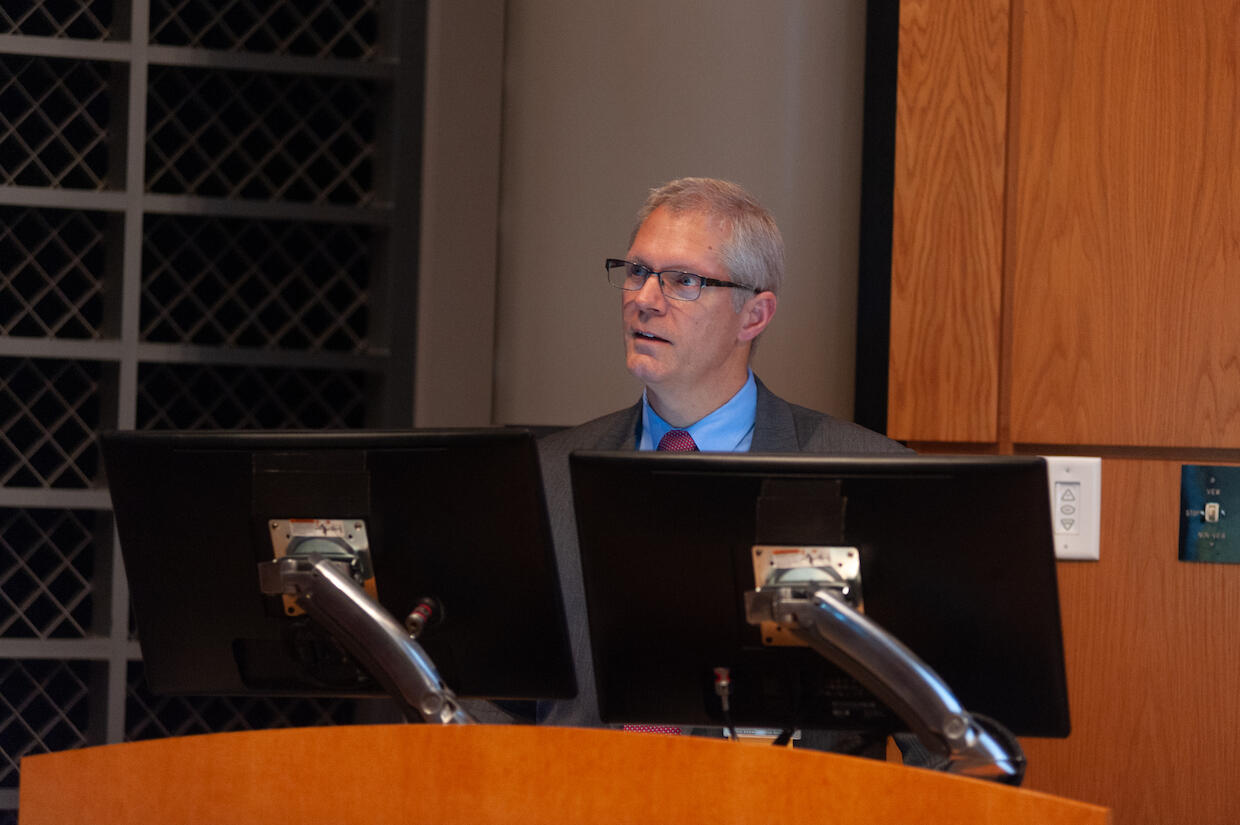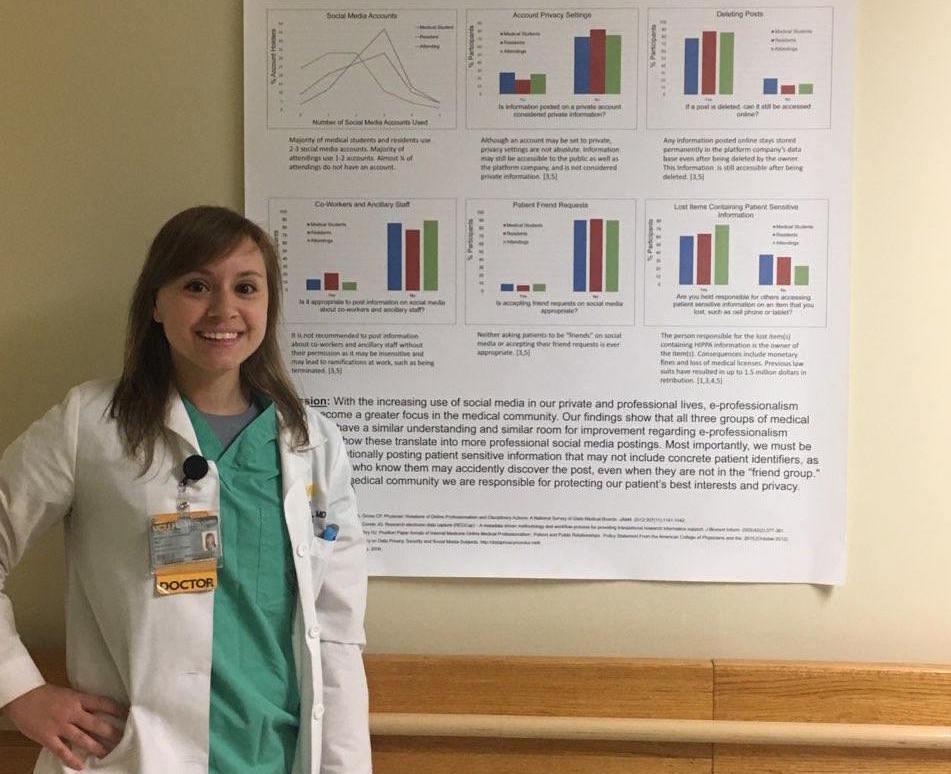
June 19, 2018
Opioid guidelines, snakebite victims: For VCU residents and fellows, research is revealing
Share this story
Medical residents and fellows at Virginia Commonwealth University are applying scientific research to reveal inefficiencies in opioid prescribing guidelines, assess standard practices for hospitalizing snakebite victims and evaluate appropriate social media conduct among medical professionals.
Nearly 90 residents and fellows showcased their research on these topics and others at the university’s annual Resident-Fellow Research Day on June 7. The daylong research symposium showcases research efforts and provides an opportunity for residents to network and generate new ideas with colleagues at an early stage of training, said Evan Reiter, M.D., vice chair and professor in the Department of Otolaryngology at VCU School of Medicine and founder of the event.
“Getting people from different specialties together is a great part of the event,” Reiter said, adding that research the residents and fellows conduct during residency often provides a foundation for building more extensive research portfolios.
“Research allows residents and fellows an opportunity to develop skills or an area of interest that they could carry forward in their careers,” Reiter said.
VCU News interviewed several residents and fellows about their work:

Narcan or Narcan’t?
As a hospice and palliative care fellow in the Department of Internal Medicine, Lindsey Hunt, M.D., often provides care to late-stage cancer patients treated at Massey Cancer Center’s outpatient palliative care clinic. At Resident-Fellow Research Day, she presented a case report on a Massey patient who was prescribed high-dose opioids.
When the patient went to his pharmacy to have the prescription filled, Hunt said, the pharmacist said he would not provide the opioid medication unless the prescribing physician also sent an order for the opioid overdose reversal medication Naloxone, which is sold under the brand name Narcan.
“Based on Virginia’s prescribing guidelines, the patient was not included in the patient population that is required to have Narcan filled with their opioid prescription because he is a cancer and a palliative care patient, but the pharmacist still did not give him opioids,” Hunt said.
The event occurred on a Friday afternoon, so the patient would have had to wait three days to have the prescription filled and was at risk for withdrawing from opioids in the process. The patient eventually was able to fill his prescription at another pharmacy, but the situation prompted Hunt to examine opioid prescribing guidelines as they relate to Narcan prescriptions.
“The case study revealed the loopholes in the system,” Hunt said.

Pharmacists have standing orders from the state to provide the opioid antidote to any resident who requests it, so they would have been able to provide Narcan without including physicians, “but giving everyone Narcan also isn’t the answer,” Hunt said.
“Now that people are talking about opioid overdoses, the pendulum is swinging into people wanting to give Narcan to everyone who has ever been prescribed opioids,” she said. “That is not exactly the right approach.”
There needs to be more education provided to people who are prescribed Narcan and to caregivers of patients who have been prescribed high-dose opioids, Hunt concluded, otherwise the opioid antidote intervention is incomplete.
“We are asking for more research into safety outcomes,” Hunt said. “There is no data that shows giving Narcan to patients with cancer who are taking opioids increases safety. We are doing an intervention without the evidence base.”
Now that people are talking about opioid overdoses, the pendulum is swinging into people wanting to give Narcan to everyone who has ever been prescribed opioids. That is not exactly the right approach.
Snakebites and hospital stays
In the three years Michael Billet, M.D., spent as a resident at VCU Medical Center’s Emergency Department, he often treated patients with copperhead snakebites.
The emergency medicine physician studied biochemistry at the University of Virginia before completing medical school at U.Va. and entering residency at VCU. “With my background in biochemistry, I like that toxicology bridges basic science with patient-centered outcomes,” he said.
Billet presented his research on bleeding rates among Virginians bit by the venomous snake.
“Copperhead bites are generally thought not to cause serious bleeding, but the actual rate of bleeding has never been fully characterized in Virginia,” he said.
Using data from VCU Medical Center and the University of Virginia emergency departments, Billet identified patients who had been bitten by copperhead snakes. He then analyzed the patients’ laboratory bleeding profile and overall hospital course. Of the more than 200 patients included in the study, about 10 percent had evidence of increased bleeding on their blood work, but no patients had actual bleeding.
The study findings support the long-held view that copperhead snakes are less venomous than other pit vipers.
“Patients who could otherwise be discharged from the emergency department are often kept around for blood tests to identify a risk of bleeding,” Billet said. “Our study suggests that this doesn't need to be routinely performed, which would save time, money, and cut down on hospital admissions.”

What’s in a post?
In her first couple of years as an orthopaedic surgery resident, Monika Debkowska, M.D., noticed that while most of her medical peers used social media in their personal lives there were no institutional guidelines that set the standard for appropriate social media conduct for medical students and residents.
“Most medical professionals my age and younger have been using social media since high school or even middle school,” the 29-year-old said. “It is a way of life for many millennials.”
In her research, Debkowska set out to understand what medical students, residents and attending physicians felt was professional behavior online. “I wanted to know if the views of medical professionals on e-professionalism have changed as they gained knowledge and experience throughout their careers,” Debkowska said.
She sent a questionnaire to VCU medical students, residents and attending physicians asking if certain scenarios were professional such as: “Do you think it is appropriate to post information related to your co-workers and ancillary staff?” and “Do you think it is appropriate to accept friend requests from patients on social media?”
The results were reassuring, with the majority of students, residents and attending physicians reflecting views outlined in the American Medical Association’s recently published guidelines on appropriate social media conduct.
Most medical professionals my age and younger have been using social media since high school or even middle school. It is a way of life for many millennials.
“E-professionalism is a very new concept and is only recently being studied,” Debkowska said, adding that the study was the first of its kind at VCU.
The third-year resident plans to conduct follow-up research evaluating publicly available social media profiles of residents in which she will use a professionalism score sheet to determine what percentage of profiles are professional. Debkowska also plans to study the non-medical community’s opinion via questionnaire on what is acceptable for medical professionals to post on social media.
“My research outcomes will help continue [to] spread awareness on the importance of medical e-professionalism,” she said. “There is a lot to discuss to make sure that we protect our patients’ privacy, not only at work or social settings but also online.”
Subscribe to VCU News
Subscribe to VCU News at newsletter.vcu.edu and receive a selection of stories, videos, photos, news clips and event listings in your inbox.










